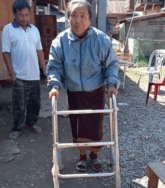Helping a Friend Advocate for Their Health Needs
October 20th, 2022 | Stories
Noy trying out Nee’s walking frame to help her move around. Photo by QLA CBID Facilitator.
My condition was so sudden and I never expected it would happen to me. I had a stroke and it affects my mobility so my lower part can not move properly, my vision is limited, so I can only see two meters in front of me, and my memory is unstable. Thanks to my neighbor, Nee who also had difficulty in mobility and is a CBID beneficiary, she let me try using her walking frame and it fits perfectly for my condition.” – Noy
Noy’s life changed suddenly when she had a stroke. She became partially paralyzed, lost some of her vision making her unable to see things at a distance, and she experiences occasional memory loss. As a result, she was dependent on her husband for mobility.
One of Noy’s neighbors, Nee, also has challenges with her mobility. To increase her independence, she received rehabilitation services and assistive products from the USAID Okard Community Based Inclusive Development (CBID) team. Nee uses a wheelchair, walking frame, and handrails to help her get around at home. Noy’s husband saw Nee’s progress after receiving support from the CBID team and decided to talk with Nee and her family to see if this might also help his wife.
Nee happily let Noy borrow her walking frame to see if it would work for her. After trying it out, Noy could see how much having her own walking frame would help her move around. The village chief connected Noy and her husband with the CBID team and local authorities. The CBID team provided Noy with a walking frame, and advised her to practice walking every day with the support of her husband. They also showed Noy’s husband how to build handrails at the house so she can practice walking safely. The team referred Noy to the Provincial Rehabilitation Center for a comprehensive rehabilitation assessment and treatment program to enhance her mobility and participation in day-to-day life.

Noy receiving her own walking frame from the CBID team. Photo by QLA CBID Facilitator.
The friendship between Nee, Noy, and their families has been an important catalyst to help Noy recover from her stroke. Nee motivated Noy and her husband to seek support, advocate for her health and rehabilitation needs, and imagine a positive future where Noy is more independent. Noy and Nee remain friends and share life experiences and tips to thrive with their disability. CBID teams continue to build connections between people with disabilities and encourage peer to peer support.
World Education fosters enduring partnerships across regions and sectors to advance education outcomes for all. We offer education systems strengthening, program design and implementation, applied research and evaluation, capacity development, and policy development services.